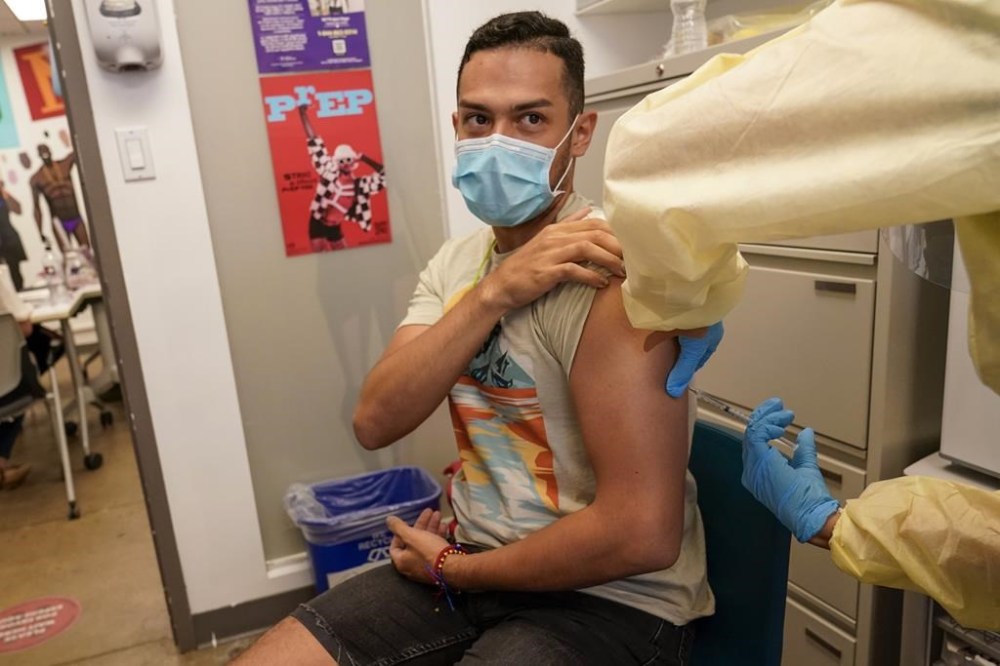WHO: Monkeypox cases drop 21%, reversing month-long increase
Advertisement
Read this article for free:
or
Already have an account? Log in here »
To continue reading, please subscribe:
Monthly Digital Subscription
$0 for the first 4 weeks*
- Enjoy unlimited reading on winnipegfreepress.com
- Read the E-Edition, our digital replica newspaper
- Access News Break, our award-winning app
- Play interactive puzzles
*No charge for 4 weeks then price increases to the regular rate of $19.00 plus GST every four weeks. Offer available to new and qualified returning subscribers only. Cancel any time.
Monthly Digital Subscription
$4.75/week*
- Enjoy unlimited reading on winnipegfreepress.com
- Read the E-Edition, our digital replica newspaper
- Access News Break, our award-winning app
- Play interactive puzzles
*Billed as $19 plus GST every four weeks. Cancel any time.
To continue reading, please subscribe:
Add Free Press access to your Brandon Sun subscription for only an additional
$1 for the first 4 weeks*
*Your next subscription payment will increase by $1.00 and you will be charged $16.99 plus GST for four weeks. After four weeks, your payment will increase to $23.99 plus GST every four weeks.
Read unlimited articles for free today:
or
Already have an account? Log in here »
Hey there, time traveller!
This article was published 25/08/2022 (1203 days ago), so information in it may no longer be current.
GENEVA (AP) — The number of monkeypox cases reported globally dropped 21% in the last week, reversing a month-long trend of rising infections and signaling that Europe’s outbreak may be starting to decline, the World Health Organization said Thursday.
The U.N. health agency reported 5,907 new weekly cases and said two countries, Iran and Indonesia, reported their first cases. To date, more than 45,000 monkeypox cases have been reported in 98 countries since late April.
The Americas accounted for 60% of cases in the past month, WHO said, while cases in Europe comprised about 38%. It said infections in the Americas showed “a continuing steep rise.”

At a press briefing on Thursday, WHO Director-General Tedros Adhanom Ghebreyesus said although there were indications the monkeypox outbreak was slowing in Europe, which once accounted for 90% of the world’s lab-confirmed cases, the spread of the virus was now causing concerns elsewhere.
“In Latin America in particular, insufficient awareness or public health measures are combining with a lack of access to vaccines to fan the flames of the outbreak,” Tedros said.
In late July, Tedros declared the unprecedented spread of monkeypox to dozens of countries to be a global emergency, despite a lack of consensus on his expert committee.
The Africa Centers for Disease Control and Prevention said Thursday the continent had 219 new cases in the past week, a jump of 54%. Most were in Nigeria and Congo.
British health authorities said last week there were “early signs” the country’s monkeypox outbreak was slowing. The U.K.’s Health Security Agency downgraded the country’s monkeypox outbreak last month, saying there was no evidence the once-rare disease was spreading beyond men who were gay, bisexual or had sex with other men.
Since monkeypox outbreaks in Europe and North America were identified in May, WHO and other health agencies have noted that its spread was almost exclusively in men who have sex with men.
Monkeypox has been endemic in parts of Africa for decades and experts suspect the outbreaks in Europe and North America were triggered after the disease started spreading via sex at two raves in Spain and Belgium.
WHO’s latest report said 98% of cases are in men and of those who reported sexual orientation, 96% are in men who have sex with men.
“Of all reported types of transmission, a sexual encounter was reported most commonly,” WHO said.
Among the monkeypox cases in which the HIV status of patients was known, 45% were infected with HIV.
WHO has recommended that men at high risk of the disease temporarily consider reducing their number of sex partners and refraining from group or anonymous sex.
Monkeypox typically requires skin-to-skin or skin-to-mouth contact with an infected patient’s lesions to spread. People can also become infected through contact with infected clothing or bedsheets.
With globally limited vaccine supplies, authorities in the U.S., Europe and the U.K. have all begun rationing doses to stretch supplies by up to five times.
WHO has advised countries that have vaccines to prioritize immunization for those at high risk of the disease, including gay and bisexual men with multiple sex partners, and for health workers, laboratory staff and outbreak responders.
While Africa has reported the most suspected deaths from monkeypox, the continent has no vaccine supplies apart from a very small stock being tested in a research study in Congo.
“As we know, the situation with monkeypox vaccine access is very topical, but there are not enough doses of vaccines,” Nigeria Center for Disease Control Director-General Ifedayo Adetifa said this week. “Potentially, a lot more more doses will become available, but because of challenges with manufacturing factories and unexpected uptick in monkeypox cases, the vaccine may actually not be available until 2023.”
___
Chinedu Asadu in Abuja, Nigeria, and Jamey Keaten in Geneva contributed reporting.
___
Follow AP’s coverage of monkeypox at https://apnews.com/hub/monkeypox


